MercoPress. South Atlantic News Agency
Tag: Rodolfo Nin Novoa
-
Saturday, March 26th 2016 - 07:03 UTC
Mercosur and Unasur can't agree on a statement of support for Dilma Rousseff
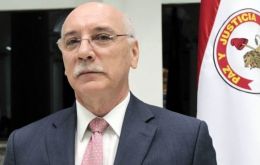
The attempt by Uruguay to draft a strong Mercosur and Unasur resolution in support of embattled Brazilian president Dilma Rousseff has foundered. Argentina is only prepared to express support for Brazil's institutions while Chile and Paraguay have balked at the idea of personalizing the issue in Rousseff and her Workers Party.
-
Saturday, March 19th 2016 - 09:13 UTC
Brazilian situation shows division among Unasur members
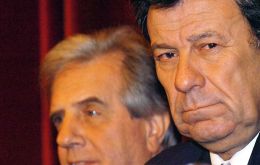
Unasur, the Union of South American Nations is divided on how to address the Brazilian situation: while Uruguay, Venezuela, Ecuador and Bolivia have agreed on a strong statement in support of president Dilma Rousseff, Argentina expressed 'institutional support' and Chile abstained.
-
Friday, March 18th 2016 - 03:03 UTC
It's official: Mercosur and EU will exchange offers for a trade accord on 8 April
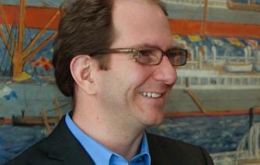
Argentina is willing to “make concessions” in order to move forward with a free-trade agreement between Mercosur and the European Union (EU), which will likely allow a greater export of agricultural produce, according to Argentina's Trade Secretary Miguel Braun who then reveled that trade offers will be exchanged on April 8.
-
Monday, March 7th 2016 - 04:06 UTC
Tax agreement between United Kingdom and Uruguay
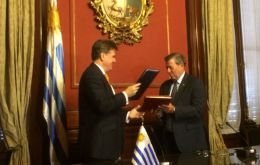
United Kingdom and Uruguay signed a convention to avoid double taxation and prevent fiscal evasion related to taxes on income and on capital. British Ambassador Ben Lyster-Binns and the Uruguayan Foreign Minister Rodolfo Nin Novoa signed the agreement in a ceremony at the Palacio Santos in Montevideo.
-
Monday, February 29th 2016 - 09:31 UTC
Uruguay prepared to lead Mercosur/EU trade negotiations during the whole year
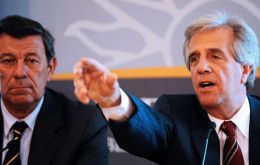
Uruguay, now with the support from Argentina, is very much interested in advancing with the cooperation and trade agreement between Mercosur and the European Union, and is planning for president Tabare Vazquez to attend a Brussels meeting with EU officials to emphasize the matter.
-
Saturday, February 20th 2016 - 06:03 UTC
Argentina and Uruguay agree that integration and Mercosur are the priorities
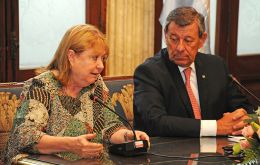
Argentina and Uruguay foreign ministers agreed to hold twice a year meetings to address all issues in the bilateral agenda but with emphasis on integration and Mercosur which are 'our main concerns'. Susana Malcorra met with her peer Rodolfo Nin Novoa in Montevideo on Friday and after a several hours meeting made brief statements with no questions taken from journalists.
-
Wednesday, November 11th 2015 - 07:35 UTC
Uruguay hopeful of a more 'flexible' Argentina whoever wins on 22 November
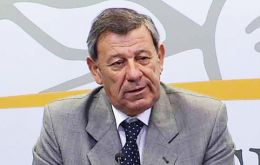
The Uruguayan government is hopeful that with president Cristina Fernandez no longer at the helm of Argentina, as of 10 December, a more flexible attitude can be expected from the newly elected authorities, particularly regarding Uruguay's intention of signing trade agreements with third parties, if Mercosur is not interested in such commitment.
-
Saturday, August 15th 2015 - 08:50 UTC
Uruguay says Brazil rejects idea of leaving Mercosur, but agrees that deep changes are urgent
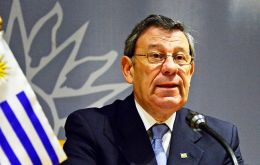
Uruguay's foreign minister said on Friday that “nobody” supports the proposal from the Brazilian Senate president Renan Calheiros to put an end to the Mercosur customs union. However he did point out that he proposal exposed that the block effectively is 'not working' and needs to have its foundations reviewed.
-
Saturday, July 18th 2015 - 09:29 UTC
Mercosur agrees to give intra-trade a new boost eliminating barriers
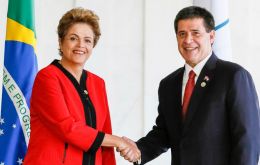
Mercosur agreed at the Brasilia summit that in the second half of the year they will address alternatives for the elimination of tariff and other similar barriers that impede the natural flow of trade of goods and services among its members. The initiative was agreed by Common Market Council, CMC, on the first day of deliberations and confirmed on Friday by the presidents of the group's full members.
-
Friday, July 17th 2015 - 07:14 UTC
Uruguay after a Mercosur 'action plan' to eliminate all inter-trade restrictions

Uruguay is attending the Mercosur summit in Brazil hoping the group implements deep changes, particularly referred to the free circulation of goods, services and production factors, and considers a six month period should be sufficient trial for the changes to become effective.
